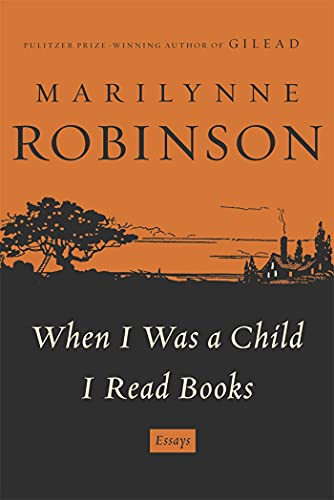When I Was a Child I Read Books: Essays

“Ms. Robinson is correct to point out that liberalism and religion are not incompatible and that there are enough historical examples and living persons bearing witness to the fact. Despite this, the illiberal face of religion more often than not wins the upper hand whether in the direct confrontation of faiths or in the latter’s use in the context of political campaigning. It would be interesting and useful to reflect more on this conundrum in a future volume.”
In this book of essays Marilynne Robinson reflects on books she has read, the teachings of religious teachers, the writings of scientists, and more generally, the discourse on some of the big questions of our times.
In the essay bearing the same title as her book she informs the reader that she has been reading since she was a child, and that this is what has enabled her to assume a positive perspective on individualism—as referring to the freedom of reflection rather than egotism.
It is this positive form of individualism and the generosity that goes with it that America risks losing today and with that also its “loyalty to democracy.” Moreover, this demoralizing movement is led mainly by two groups, which may also overlap, namely those who believe in neo-liberalist thought or “the economics of the moment,” and those who think of religion in absolute and exclusive terms.
As a practicing Christian, Marilynne Robinson finds this offensive, therefore her latest volume of essays can also be read as an appeal to remember and uphold the long and rich tradition of liberal Christian thought.
The book comprises ten essays, some, like “Austerity as Ideology” explicitly attacking specific political programs by drawing on religious texts in order to back an alternative approach; others like “Who was Oberlin?” using an example from the not so distant past to recall the earlier alliance between “a revivalist style of religion” and liberalism; yet others, like “Freedom of Thought” and “Cosmology” seeking to convince scientists who reject religion to replace their polemic atheism with a more discursive agnosticism.
Besides being a prolific writer of both fiction and nonfiction, Marilynne Robinson is known to occasionally preach, and the essays of When I Was a Child I Read Books are likewise written somewhat in the style of sermons—like parts of her novels—her intuitive style of writing adding to the atmospheric vibrations of her words.
Readers who have enjoyed her previous books will very likely find much to admire and learn also from this book.
As a less religious reader, I occasionally wished that Ms. Robinson would spend more time discussing the less constructive—or, indeed, outright destructive—lines of argumentation in religious thought. One of the problems of theology—and this is true of all religions and denominations—is that it is never unequivocal, yet it presents itself as such. This, ultimately, is also what distinguishes it from other lines of inquiry or reflection, be it science, humanities or the arts, that set out to explore uncertainty as opposed to seeking to provide grounding for faith.
Ms. Robinson is correct to point out that liberalism and religion are not incompatible and that there are enough historical examples and living persons bearing witness to the fact. Despite this, the illiberal face of religion more often than not wins the upper hand whether in the direct confrontation of faiths or in the latter’s use in the context of political campaigning. It would be interesting and useful to reflect more on this conundrum in a future volume.